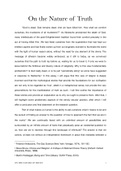On the Nature of Truth
“God is dead. God remains dead. And we have killed him. How shall we comfort
ourselves, the murderers of all murderers?”1 As Nietzsche proclaimed the death of God,
many intellectuals of the post-Enlightenment tradition found their comfort precisely in the
act of having killed Him. We had freed ourselves from the superstition that had kept our
intellect captive and had nally woken up from our dogmatic slumber to illuminate the world
with the light of human reason alone, without the need for any element of the divine. The
message of atheism became widely embraced, as it still is today, as we convinced
ourselves that the path to truth lay before us, waiting for us to travel it, if only we were to
leave behind the ctitious and illusory nature of religiosity. Why is this view fundamentally
problematic? Is God really dead, or is he just “periodically ailing” as some have suggested
in response to Nietzsche.2 In this essay, I will argue that this view of religion is deeply
incorrect and that the mythological stories that provide the foundations for our civilisation
are not only to be regarded as ‘true’, albeit in a metaphorical sense, but provide the very
preconditions for the manifestation of truth as such. I will rst outline the importance of
these stories and provide an explanation as to why we ought to preserve them. After that, I
will highlight some problematic aspects of the strictly secular position, after which I will
o er a conclusion and nal statement on the research question.
Part of what makes us human is the ability to ask ourselves what it means to be and
the pursuit of nding an answer to the question of how to approach the fact that we are in
the world.3 We are continually faced with an unlimited amount of possibilities and
surrounded by an in nite amount of facts that perpetually pose an existential question to
us; how are we to traverse through this landscape of in nitude? The answer is that we
cannot, at least not without an interpretative framework in place that mediates between a
1 Friedrich Nietzsche, The Gay Science (New York: Vintage, 1974), 181-182.
2Steve Bruce, Choice and Religion: A Critique of Rational Choice Theory (Oxford: Oxford
University Press, 1999).
3 Martin Heidegger, Being and Time (Albany: SUNY Press, 2010).
ON THE NATURE OF TRUTH 1
, given fact and the meaning that can be derived from that fact. A fact as such does not lend
itself to provide us with any sense of the meaning that is needed to sustain us through life
or to guide our principles and desired behaviour. In other words, an ought cannot be
derived from an is, as Scottish philosopher David Hume put it.4 This mediating framework
turns out to be the very mechanism through which we orientate ourselves in the world in
the face of the in nitude of facts, and guides us in discerning what is worth pursuing and
what is not in the great mystery that is life. To exist and to live requires a map and the
scienti c method is the best tool at our disposal for describing that map, but only an ethical
framework that interprets the world can tell us which route to take.
To describe the nature of this mediating principle, it is worth discerning between
di erent forms of knowledge. First of all, there is articulated knowledge or that which we
have studied and been able to translate into language and thereby making it clear to
ourselves that we are aware that we have this knowledge. An example of this would be
anything that we would label as ‘scienti c fact’. In opposition to that stands everything that
exists outside of our sphere of comprehension or that which we know nothing about. This
realm includes some of our modes of behaviour, for we know since Freud that there is much
more to us human beings than we know and have transformed into articulated knowledge.
5Between these two opposites is something akin to a dream or a ‘collective unconscious’,
as Carl Jung formulated.6 It is here where the artists and the mystics reside, for they
continually retrieve information from that which transcends the human experience and
brings it to us in a form that allows us to grapple with that information, albeit not in an
articulated manner. This is why we can sometimes be struck by the beauty of a work of art
or feel incredibly moved by a well-written piece of music, for they reveal to us some
aspects of the transcendent, albeit in a cryptic manner that we cannot articulate.
The religious and mythological stories that underlie the Biblical corpus, and
therefore Western civilisation, also nd their genesis in this collective dream. It is therefore a
4 David Hume, A Treatise of Human Nature (Auckland: The Floating Press, 2009), 715.
5 Jordan Peterson, Maps of Meaning (London: Routledge, 1999).
6Carl Jung, The Archetypes and the Collective Unconscious (London: Taylor & Francis Ltd.,
1991).
ON THE NATURE OF TRUTH 2





